Archive for June 2020
Father Day’s gift at Auburn’s Grab ‘N Go program
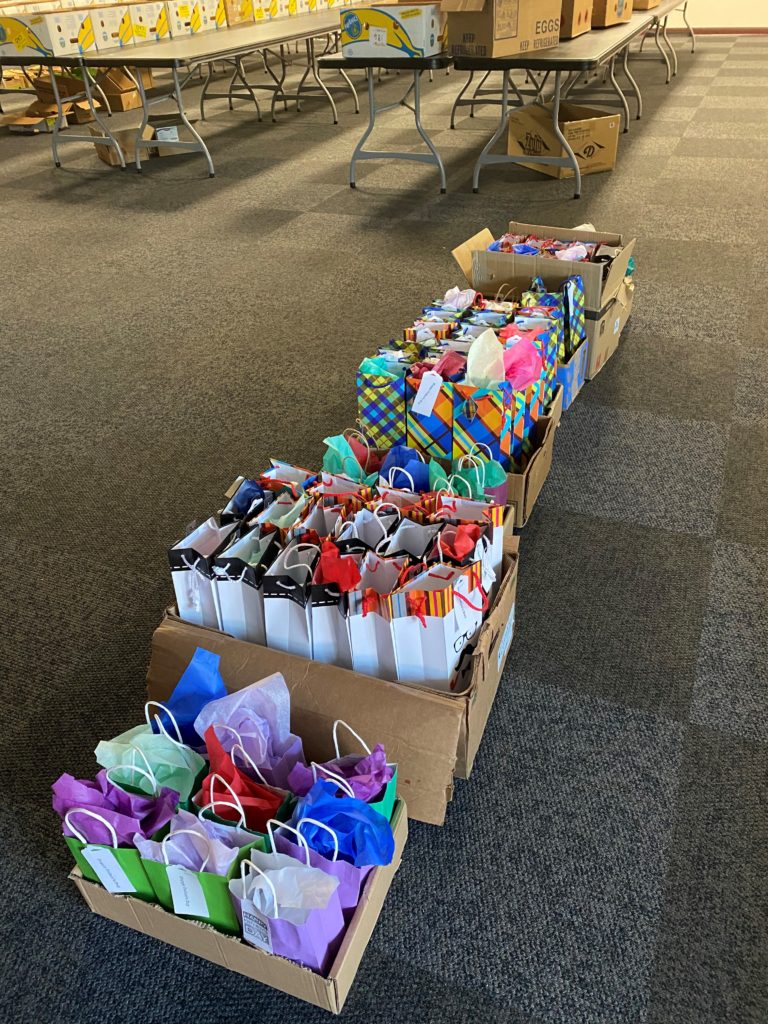
The City of Auburn’s Grab ‘N Go grocery program added a little surprise with Wednesday’s pick-up, just in time for Father’s Day. Through the coordination of a local community member, Tizz Crowley, several volunteers stepped up to create 75 Father’s Days gifts to be passed out with the grocery boxes on Wednesday. The city extends a very special “thank you” to the five local community members who arranged this special gift: Ed and Sheila Desgrosseilliers on behalf of the Auburn Democrats, Joan Pedersen, Mary Roussel, and Tizz Crowley.
“Once again our amazing community continues to perform selfless acts of kindness,” said Auburn’s Recreation Director, Sabrina Best. “These gifts brought joy to many families that really need it right now.”
The Grab ‘N Go grocery program is scheduled to continue through the end of August and is free for any Auburn resident. If you or someone you know is in need of food, reach out to the Auburn Recreation Department at 333-6611. For more information on how to support this impactful community program, please contact Sabrina Best at sbest@auburnmaine.gov.
Separated by the pandemic part 4: Facilities still locked down
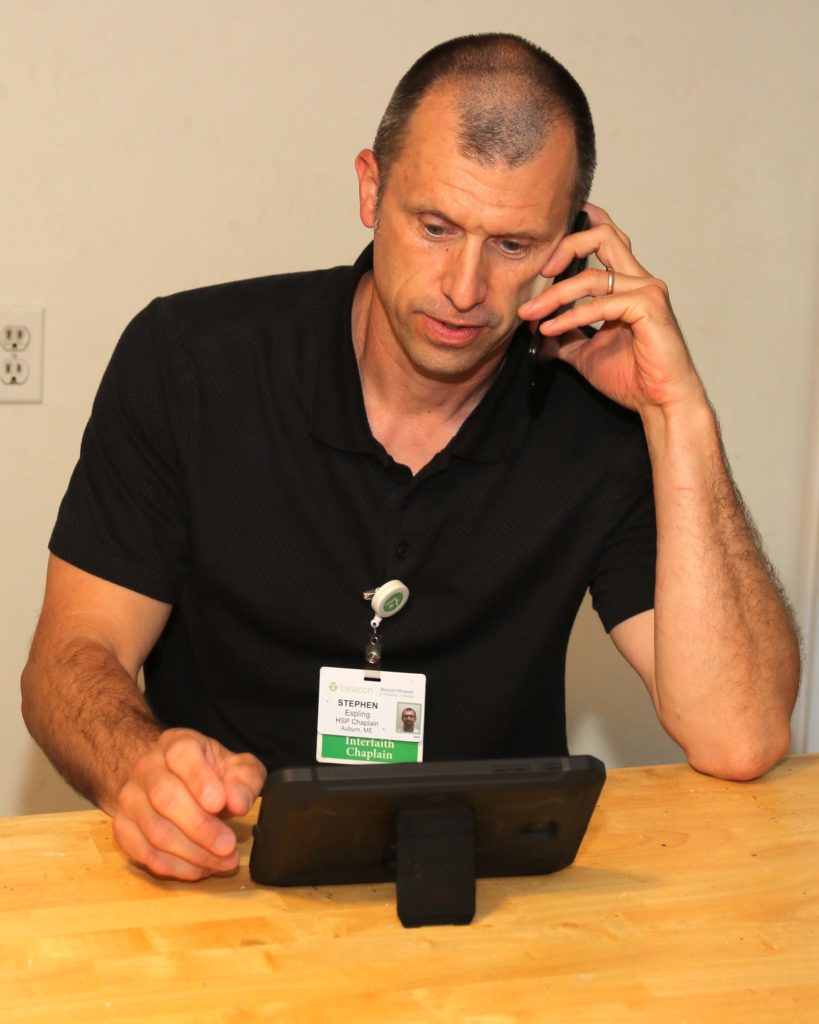
The following story is the fourth of several interviews being done by Nathan Tsukroff of PortraitEFX to capture the effects of this pandemic on the people of Maine.
Maine is starting to open up again.
Well, most of Maine is starting to open. But not hospitals, and not nursing homes, and not assisted living homes like The Sarah Frye Home on Washington Street North in Auburn.
Not this week. And maybe not next week. In fact, MaryAnn Guenette, Activities Director, said last week she isn’t sure when The Sarah Frye Home will be allowing family members and guests to enter the facility. They plan to maintain social-distancing protocols for a little while after the State of Maine lifts restrictions, to ensure patients will not have a chance of infection from the Covid-19 coronavirus.
Seniors Not Acting Their Age: Sea kayaking begins at Mere Point

By Ron Chase
Like my Native American ancestors, when the blackflies arrive, I gravitate to the coast. Consequently, for me, sea kayaking normally begins in late May or early June when the nasty blood suckers begin to proliferate in the mountains and on the rivers. The pandemic has added another incentive as sea kayaking doesn’t require a shuttle and social distancing is more easily accomplished where there is an abundance of space such as the ocean.
For outings in northern Casco Bay, I frequently use Mere Point Boat Launch in Brunswick. Boat access along the coast of Maine is a challenge as there is a significant shortage of options. About fifteen years ago, I was part of a boat access committee organized by the Maine Department of Conservation. Interested groups from all over the state participated and I represented recreational canoeists and kayakers on behalf of my outdoor club. We met several times over a two-year period. During my tenure, I advocated for the state to partner with existing marinas and campgrounds to increase access rather than build costly controversial boat landings like Mere Point. For reasons I never understood, my recommendation seemed to be considered heresy by ranking state officials on the committee. Eventually, they stopped scheduling committee meetings. Call me cynical but I don’t believe they were interested in the advice proffered by members but rather had an unstated agenda. From my admittedly biased viewpoint, the contentious nature of the birth of Mere Point Boat Launch seemed to validate my proposal.
That said, Mere Point is an exceptional facility and now that it exists, I take full advantage. There is substantial paved parking, two concrete launches, a dock, a well-organized system for loading and unloading boats, and two toilets, closed at present due to Covid-19. I understand the concerns about spreading the coronavirus but don’t get the logic behind opening the facility but keeping the toilets closed. I suspect people still need to use a toilet during the pandemic. If you’re an old man like me, the call occurs more often than I care to relate. I’m not a scientist, just thinking…
Spring and summer programming at The Root Cellar

In step with the Governor’s reopening plan for Maine, The Root Cellar in Lewiston set in motion their first stage of programming post pandemic shut-down on June 1. Dubbed Sensational Spring, neighborhood teens and young adults are volunteering in a mentor/tutor capacity with very small groups of children in a two-session, day camp style program. The mentors, some returning from previous summer programming, are trained to work with children, meeting them where they’re at and working to cultivate relationships. These teens and young adults will continue to develop their leadership skills throughout the summer as they mentor groups for Sensational Spring and for Super Summer (beginning July 6).
The children and mentors are put into small, S.U.P.E.R. Groups (which stands for Supporting, Uniting, Preserving, Empowering, Relationship Group). Each day is split into two sessions. The morning session, called Brain Food is from 9 to 11 a.m. During this session, the groups eat breakfast and work on writing, math, health science, and tutoring. The afternoon session, from 12 to 3 p.m., is extra-curricular activities focusing on sports, games, art and character development.
Although Sensational Spring has been going well for over two weeks, it has not been without some challenges.
The Root Cellar staff carefully prepared a COVID-19 Policy for their Spring/Summer programming, with over 50 policies following CDC guidelines for day camps and recreation. Among these guidelines are the requirements that the groups are small and all children, mentors and staff are required to wear masks during any interaction.
“The kids have adjusted pretty well,” says Mentorship Program Coordinator Alyssa Morgosh, but it has definitely been a transition for everyone, especially compared to last Summer’s activities at The Root Cellar. This difference in operations due to the pandemic is part of the reason Morgosh started Sensational Spring as a stepping-stone for this summer’s Super Summer. It gives the kids time to “adjust to something different than they’re used to at the Root Cellar,” said Morgosh.
While this year has and will look a lot different than any other year, it has been filled with opportunities to bring God’s kingdom to the neighborhood. Many needs have arisen due to the pandemic, a primary one being food security. For many children, school was the primary way they received nutritious meals for breakfast and lunch.
Along with expanded food pantry resources for the neighborhood, The Root Cellar became a primary location for breakfast and lunch distribution, in partnership with the Lewistion Public School System. Through distributing lunches, staff and volunteers at the Root Cellar have been able to connect with a significant number of families and children.
Accompanying the meals distributed everyday were Brain Food worksheets for all levels of grade-school, prepared and distributed every morning by Morgosh, and staff members Emily Bollinge, and Victoria Derosier.
And despite having limited capacity amid the pandemic, the small groups have been a blessing in disguise. The required structure allows for “a phenomenal staff ratio of two to one. Because of keeping the groups small, we’ve made a tremendous impact in these kid’s lives.” Morgosh explains. These small SUPER Groups allow for relationship development and opportunity among friends and neighbors to cultivate social, economic and spiritual wholeness.
“We’ve had to get creative for field trip opportunities because of COVID-19 and social distancing,” Morgosh says. However, because of this, the kids have gotten to experience new things. One example Morgosh shared was that two children learned how to ride bikes during the programming so far, when they had never been on a bike before.
The staff and volunteers are working hard to be a part of the neighborhood this summer despite necessary restrictions due to the pandemic and they look forward to a COVID-aware Super Summer beginning soon.
Stay tuned for more information on summer programming for The Root Cellar in Lewiston and The Root Cellar in Portland. You can also visithttps://therootcellar.org for more information.
Separated by the pandemic part 3: Caring for the Caregivers
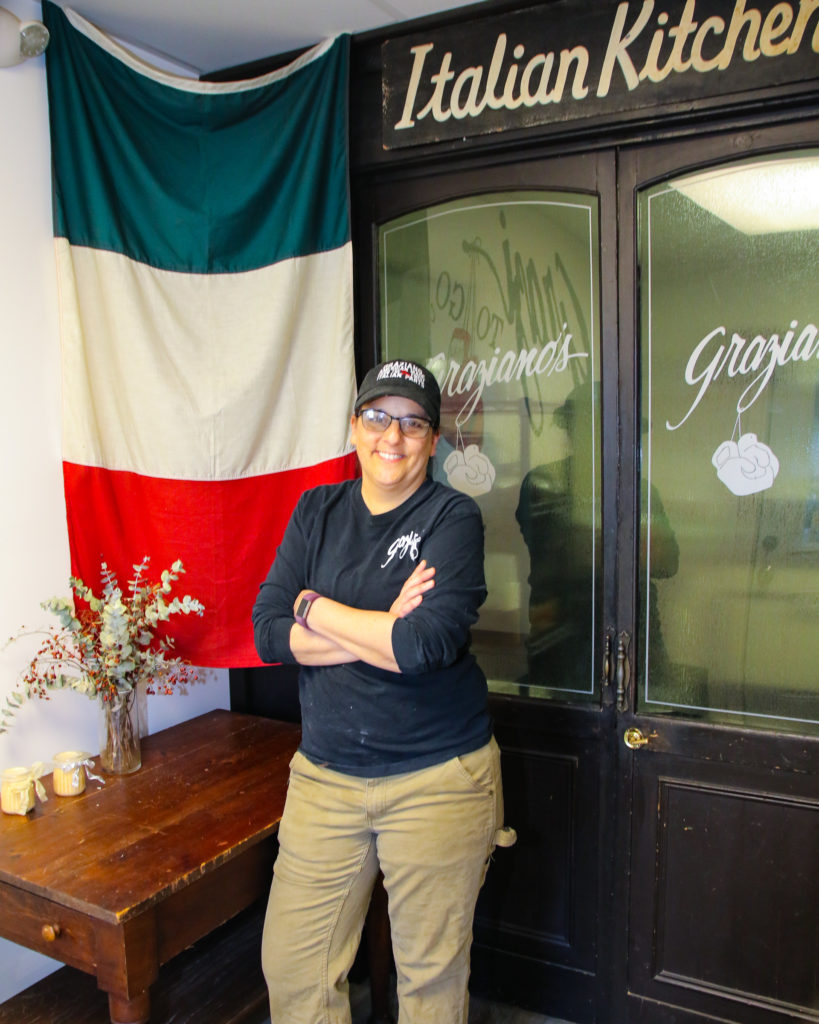
The following story is the third of several interviews being done by Nathan Tsukroff of PortraitEFX to capture the effects of this pandemic on the people of Maine.
Healthcare workers do everything they can to care for their patients. But who is caring for the caregivers?
Mary Graziano Richard, owner of Grazi To Go, which opened in the basement of an old church in Lisbon in January 2019, brings 70 to 80 meals each week to caregivers at the Central Maine Medical Center and St. Mary’s Regional Medical Center in Lewiston.
“We try to do day and evening shifts, so each shift can get some,” she said. Meals are delivered either Wednesdays or Thursdays.
Richard said that Jessica Strelitz, a Brunswick native now living in Virginia, reached out to her and asked if she would be willing to collaborate on a project raising money and feeding the workers at local hospitals. “We are raising money from any local people and even folks from out of state.”
Richard is the daughter of Joe Graziano, who created Graziano’s Casa Mia Restaurant that served Italian fare from its location on Route 196 in Lisbon for 43 years. Graziano opened the restaurant in 1969. He had moved to Maine from Utica, NY, in the mid-1960’s to manage a McDonald’s restaurant in Lewiston. He died in 2000, and the restaurant was closed in 2012.
The restaurant was known for its boxing theme, with rooms in the restaurant named by round. Graziano was Chairman of the Maine Athletic Commission in the early 1990s.
Richard started working at the restaurant at 10-years-old, “doing dishes and helping clean. And then around 12, I started cooking,” Richard said. “I like making the sauce, and for meals, I like doing veal and chicken parm.”
In a nod to the family’s restaurant, Richard installed two original doors from Graziano’s Casa Mia in the Grazi To Go lobby, along with paintings and other wall art.
The menu is very similar to the Graziano’s Casa Mia menu, Richard said. One of the most popular items is the specially-made Italian dressing that customers call, “Liquid Gold”. Joe Graziano came up with the recipe for the thick dressing, which “makes the best marinated chicken or Portobello mushrooms,” Richard said.
Grazi To Go is open Wednesday, Thursday, and Friday, and only provides meals for take-out or delivery.
Out & About with Rachel Morin: Hot air balloon ride celebrates Sam Campbell’s 10th birthday
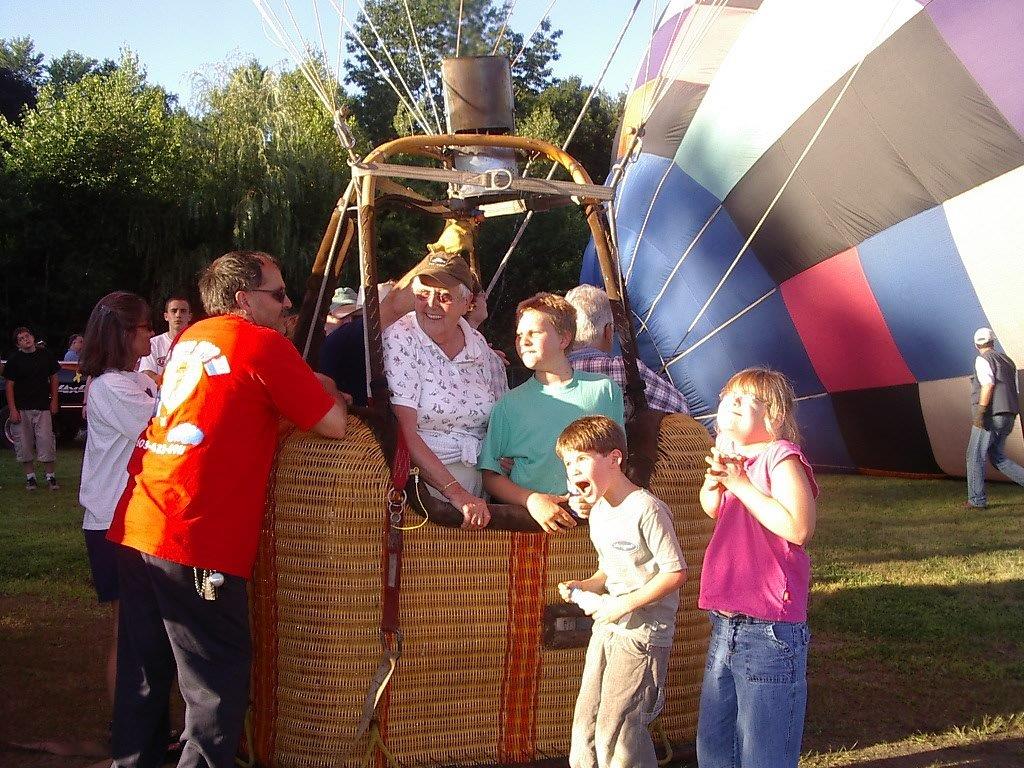
Story and photo by Rachel Morin
As we all know, The Great Falls Balloon Festival, attracting hundreds of thousands of people and tourists from all over Maine and nearby states, is sadly not happening this August in Lewiston-Auburn, another casualty of the Corona Virus. It would have been the 28th Annual and it is the first time it missed a year.
The Festival organizers met in early May and came to this decision after realizing they could not guarantee social distancing restrictions and the mandate that out of state visitors quarantine for two weeks. They released a statement saying, “In times like these, the Great Falls Balloon Festival, must consider the health and safety of our Festival goers and their families as our top priority.”
The Balloon Festival promotes tourism to Central Maine and the Festival’s mission is to help raise money for area charities. The three-day August Festival attracts 100,000 annually and is one of the top money-raisers. The crowds enjoy visiting the many food booths and craft/trade shopping booths set up throughout the park.
Several fun activities for children and adults in the other booths draw the crowds in as well. Hundreds of volunteers work these booths and live entertainment is plentiful both days and evenings.
It is a special time for seeing old friends and relatives, catching up on families’ news, seeing how much the children have grown since the last time we saw them, and seeing the newest babies that were born the past year is very exciting. It is a happy time and a rewarding time. It is fun to see so many out-of-towners from all over Maine attend, and the growing number of out-of-state tourists add to the gaiety.
My family and I have been to every Balloon Festival since its beginning in 1992 when it was an instant hit. As each grandchild was born, my husband Gerry and I would take each by the hand and show them the wonders of the colorful hot air balloons rising majestically in the air and the breeze taking them over the Androscoggin River. Sometimes the pilots would dip for a splash in the river much to the delight of the spectators on the North Bridge (James B. Longley Bridge) and South Bridge (Bernard Lown Peace Bridge).
I have so many vivid memories of each year’s Balloon Festival, but the tenth birthday of Sam Campbell, my first grandson, was stellar. This was the year his paternal Grandmother, Betty Campbell of Auburn, now of Minot, decided they would celebrate his milestone 10th birthday early, (October 6) with a first-time hot air balloon ride together! Grammie and Sam talked of nothing else as the summer progressed to the big August 2001 date at Simard-Payne Memorial Park.
The entire Morin and Campbell Families, including aunts, uncles, cousins, friends and the rest of the balloon riders arrived early that day and waited patiently as they watched many balloons being inflated.
Our balloon, The Jackie Balloon, piloted by Andre Boucher was one of the many balloons being inflated first. Each family had its assignment: each driver of the family cars would follow our balloon as best he could with the help of his passengers monitoring the sky overhead as the breeze carried the balloon along.
We wanted to be on hand when The Jackie Balloon landed! We had no idea of where the overhead breeze would take it or where it would land. We followed by car, pretty good, I must say, though I was glad I was not the driver!
We even managed to take several photos, of which some are posted here for you to see. We watched The Jackie Balloon fly over Cleveland Field in Auburn, then later over No Name Pond in Lewiston with many sightings in between.
It really was the thrill of a lifetime for Sam and his Grandmother. And even for the rest of us, especially for Sam’s younger siblings, Emma and Adam, who were really pumped up and overwhelmed.
After many sightings according to the whims of the breeze, our Jackie Balloon landed in Greene. We were right there, helping to deflate the balloon and moving the basket where the pilot designated.
There is ceremony and tradition for these balloon rides. Pilot Andre Boucher related the history of the balloon landing and how the bottle of champagne is presented to the pilot, who pops the cork, giving the crowd a sense of the history, tradition and ceremony.
As it turned out, my son Gerry Morin caught the cork and so, received the first glass of champagne. I was surprised to be offered the second glass.
And so now in 2020, the Friends and Fans of The Great Falls Balloon Festival look forward hopefully to 2021, when once again they will look to the sky and see the bright, colorful balloons carried by a gentle breeze over the Androscoggin River.
CMMC: New cancer center planned for September
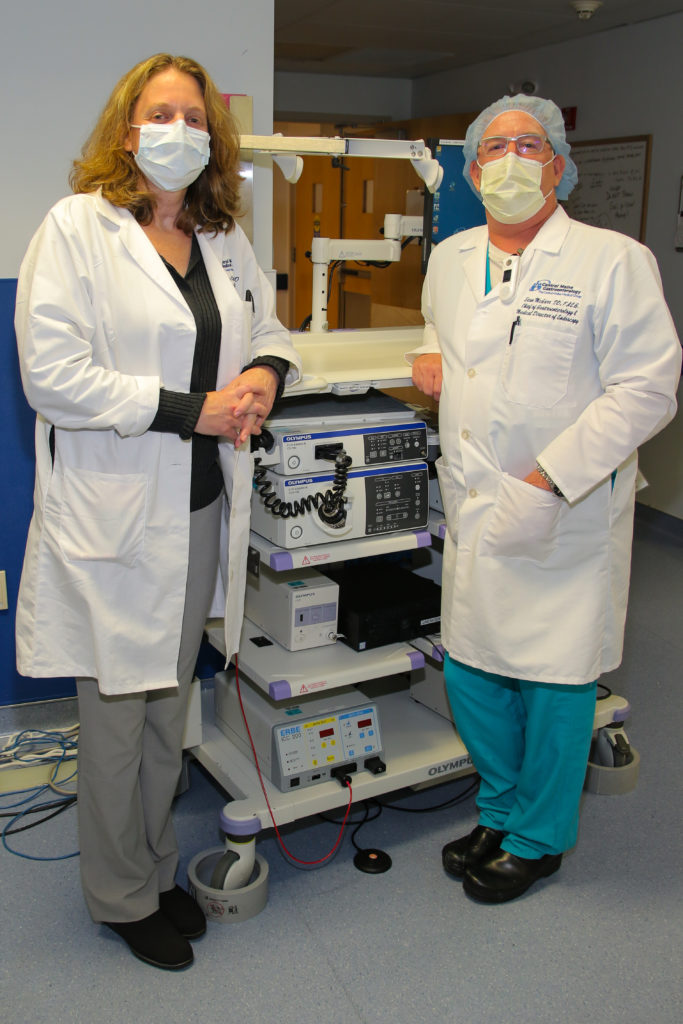
By Nathan Tsukroff of PortraitEFX
Maine has wonderful doctors and great hospitals to treat almost any illness.
What it doesn’t have is an institute for cancer treatment in the center of the state. But that will start to change in early September.
The Dempsey Center in Lewiston, founded in 2008 by Patrick Dempsey as a way to give back to the community where he grew up, is committed to making life better for people managing the impact of cancer. However, it doesn’t provide the services of doctors for treating cancer.
That’s what a planned cancer center, or institute, at Central Maine Medical Center (CMMC) will provide for much of Maine, according to Dr. Sean McGarr, a gastroenterology doctor at the hospital. With a planned groundbreaking in early September, the cancer center will bring together cancer doctors – oncologists – from throughout the area to provide comprehensive cancer services.
“We have a wonderful Dempsey Center” which provides research, social support, and help for patients to navigate through the current healthcare system as they seek treatment for cancer, Dr. McGarr said, but, “It’s not a cancer center; it’s not a cancer institution.”
CMMC’s cancer center will have “a multi-disciplinary cancer institution,” where multiple healthcare providers who specialize in cancer can be found in one place, Dr. McGarr said.
Maine is a very large state with only one other cancer center, Maine General Medical Center’s Harold Alfond Center for Cancer Care in Augusta.
Dr. McGarr, who was a Director of Gastrointestinal Oncology at Maine General before coming to CMMC, looks to make the CMMC center a partner with doctors throughout central Maine, providing continuing care for patients close to their homes after their initial cancer treatments.
“Our mission has been to make it accessible,” he said. “A lot of our patients don’t live right around the block. To come from sites that are on the coast, or sites that are up in the mountains, to come to one place . . . the goal, I think would be to see all your doctors and limit the travel to make it as efficient of a visit as you possibly can get.”
With a multi-disciplinary team, “You have radiologists looking at the film, you have oncologists that have read the biopsies, you have the surgeons that are meeting with you and talking about the options . . . those folks that specialize in cancer care, all in one spot,” Dr. McGarr said.
“We’ve come together in an area that is more centrally-located,” Dr. McGarr said. “We’re becoming more accessible by having the right doctors, the right cancer folks in one institution,” so patients don’t have to travel from town to town find the doctors they need for their treatments. Keeping all the doctors “under one roof, working together” makes for a more cohesive team with better communication, he said. “It’s better for the patient!”
Dr. McGarr said he came to CMMC about 18 months ago because he liked the fact that CMMC was growing under its new leadership and was bringing in the doctors and the physicians that his patients needed from a gastroenterology standpoint. He is a Maine native from Orrington, and did his undergraduate studies at the University of Maine in Orono, followed by medical school at Western University of Health Sciences in Pomona, CA, and an internal medicine residency at Johns Hopkins University/Sinai Hospital in Baltimore, MD.
The cancer center will not take patients away from other practices or hospitals in Maine, Dr. McGarr said. “There’s a different patient population, there’s a different need. Unfortunately, we’re seeing only more pancreatic cancer. In Maine there’s a problem with alcohol, tobacco, obesity (which) unfortunately lends itself to a higher risk of cancer.”
Cancer patients often travel to Boston for treatment, Dr. McGarr said, and the long hours of travel along with the lack of easy follow-up care make that a difficult choice for patients. “As you get older, driving to Portland’s like driving to Boston! If you come from a couple of hours north . . . Boston becomes further and further away.”
“We’re bringing the talent and bringing these physicians into Lewiston. It’s the second-biggest city in the state, and it certainly should have a cancer center,” he said.
Dr. McGarr said it makes sense to open a cancer center in Lewiston. “I think patients are demanding it. I think patients are the ones kind of dictating how healthcare is going to go in the state of Maine. And I think that’s wonderful! There should be options for patients. And patients should be able to go to whom they want to see for a physician and know that that physician has some colleagues that they work with,” and the technology and facilities that help them provide the needed services.
Along with Dr. McGarr, Dr. Lisa Rutstein, a surgical oncologist, is spearheading the drive for this new cancer center. Dr. Rutstein joined Central Maine Healthcare in Lewiston in early 2018, bringing more than 15 years of experience with a chief area of interest in the treatment of stomach, intestinal, gallbladder, pancreas and liver cancers, as well as breast and skin malignancy.
The cancer center will be located on Main Street, Lewiston, at the main entrance to the CMMC complex. It will have multi-disciplinary clinics for cancer, according to Dr. Rutstein.
In the middle and northern parts of Maine, there has not been a lot of development of the surgical subspecialties of oncology, Dr. Rutstein said, noting that CMMC has been hiring doctors from throughout Maine and elsewhere that are trained in oncology. Dr. Rutstein does surgical oncology and works often with Dr. McGarr on upper GI tract issues, along with liver and pancreatic diseases, she said. CMMC has recently brought on a new ob-gyn surgeon, a colorectal surgeon, and a neurologic-oncologic surgeon.
“The idea of the new building is that we can all be practicing together. So, if I’m seeing someone with pancreas cancer, (Dr. McGarr) can come in,” and meet the patient to do all the diagnostics, she said. “And then we have everybody in the same place and can see the patient at the same time. The advantage of that is, number one, it cuts down on the number of times the patient has to travel, and number two, it is efficient and cost-effective care because you are only charging the patient for one facility fee.”
Among the doctors who will be at the new cancer center are Dr. Nicholette L. Erickson, and Dr. Daniel C. Rausch, both hematology-oncology specialists, and Dr. Hector M. Tarraza, an ob-gyn specialist who is the new chief of the oncology institute at Central Maine Healthcare.
Having the cancer center in Lewiston means patients in northern and central Maine needing ob-gyn oncology care won’t have to travel three or four hours to find care in the southern part of the state, Dr. Rutstein said, and they will have coordinated care closer to their homes.
Dr. McGarr said it’s important for patients to be able to get care without having to travel from town to town to see doctors as needed. CMMC is building a network of providers and facilities that will provide patients and their primary care providers (PCP) with easy access to care and follow-up for cancer treatment, he said.
Dr. Rutstein said that when she first arrived at CMMC, she created an oncology center to provide patients and doctors with a single phone number to call if they have a concern about cancer, a diagnosis of cancer, or a recurrence of cancer. The doctor can say, “I think my patient has cancer,” and can call that central number. At that point, the patient is entered into the system, is assigned a personal assistant to help them navigate through the process of care, and then the oncology team determines what the patient needs. “And that’s the goal, rather than this fragmented approach, which is so frustrating for doctors.”
The cancer center, or institute, will be where “we will see, manage, (and) treat people with cancer,” Dr. Rutstein said. The Dempsey Center will provide the social care and holistic support around the institute.
In Maine, cancer services have mainly been developed in the southern part of the state, but looking at the prevalence of cancer in Maine, “it’s in the middle and northern part of the state,” Dr. Rutstein said. It can be hard for patients to reach existing services in the southern area of the state, she said.
There is now a strong surgical leader for Maine in Dr. Scott R. Johnson, who understands how to provide regional care to patients in an effective manner, Dr. Rutstein said. Johnson is a 20-year liver transplant surgeon who was a program director at Beth Israel. He “works with everybody, without bias,” and has recruited a number of excellent doctors to the CMMC team, she said.
Dr. Johnson is “very much in favor of working with everybody” in rural Maine, Dr. Rutstein said, and is now working with a lot of strong private groups in the state. “We’re developing health programs with them, and that’s under (Dr. Johnson’s) leadership.”
CMMC has a philosophy of working with everyone in Maine, Dr. McGarr said, which provides better and more sensible care for patients, since they can continue to get care at a smaller local hospital near them.
“The most important part of that relationship” between CMMC and other medical practices and hospitals “is making sure that their patient care is integrated with” that of CMMC, Dr. Rutstein said. The willingness to partner with other practices and doctors is key to a positive and successful experience for the patient. Other hospitals and doctors will be integrated “virtually” with the CMMC system to share patient information and treatment plans.
Separated by the pandemic part 2: From the caregiver’s side
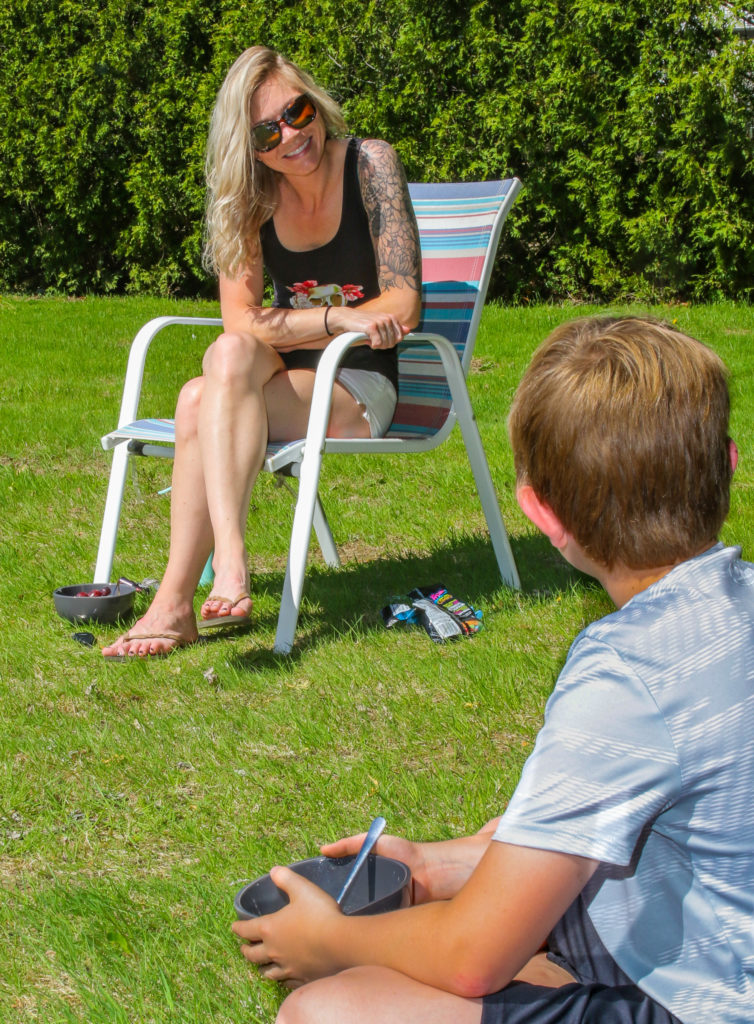
The following story is the second of many interviews being done by Nathan Tsukroff of PortraitEFX to capture the effects of this pandemic on the people of Maine.
Jamie Lefebvre of Lewiston, an aide at Beacon Hospice Care on Beacon Drive in Augusta, has not been able to touch her 11-year-old son for about two months, due to the Covid-19 crisis. And he has been staying overnight at the house where his father, Chris Nagy, lives, although the divorced couple shares joint custody.
The closest she has been able to get was several weeks ago when she donned trashbags and her mask to hug him for a few minutes.
Landon stayed overnight, socially separated, this past Mother’s Day at Lefebvre’s apartment on Beacon Street, then returned to overnights with his father.
“Pretty much, after work, I typically go to his father’s (house), they live in the neighborhood, and we just walk,” Lefebvre said. Her father helps with homeschooling for Landon, and she helps with homework as he needs.
They recently worked on a project for his school science fair. He had to “take an invention that you can buy, and then upgrade it,” she said. Landon took rubber gloves and added different pads to wash dishes and keep them germ free from Covid-19. “It was really good!” she said.
Landon presented his project remotely. Part of the assignment was to make the presentation as a famous person, so he chose Gordon Ramsey, and “had a lot of fun” with the presentation.
Lefebvre has continued working full time during the Covid-19 crisis. As an aide, she helps patients with showers and other personal care like hair and nails.
“Right now, they haven’t seen their family in pretty much two months. And so, I am pretty much that person for them,” she said. She helps patients with walks outdoors and helps them to send cards home to their families.
“It’s been really emotionally hard, working,” Lefebvre said. “My job is different” with the Covid-19 restrictions, she said, adding that she feels that as a hospice aide now, she is trying to get them to hang on until the doors open to families again.
For the hospice patients, when they are in their final 24 hours, only two family members are allowed to visit the patient, while the other family members “have to Zoom,” while their loved one is dying, she explained.
Lefebvre said she has great respect for the other hospice workers and has been following social-distancing guidelines to ensure she does not bring Covid-19 into the facility where she works. Workers are screened daily as they enter the building to care for patients.
There are patients on hospice who “are potential people who could graduate” from hospice care, Lefebvre said. A patient may decline and be provided with hospice care, then get better and no longer need that care. She said she is very aware of the need to avoid infecting any of the patients, especially for this reason.
Lefebvre said of the patients, “We give them quality, not necessarily quantity. We want their days left to be happy.”
Lefebvre has been a healthcare aide for 10 years, and said she finds her work very fulfilling. “I think they give me more than I give them, honestly. I think they have taught me great things to carry out through life.”
Being socially distanced during the Covid-19 crisis has changed her view of everyday life. “I’ve always appreciated things, small things, but now I’ll never take for granted a hug from family, my friends, and number one, my son!” she said.
“I think it’s very true that we take things for granted, and I hope that for some, it opens our eyes to how simple we could live life.” Kids are playing outside all the time now, she said, which is “a very positive situation.”
“I can’t wait for things to be back a little bit more normal, for me to actually kiss my son and hug my son,” she said. “He’s a very loving kid, so it’s been truly heartbreaking” not being able to touch him.
Poland Spring Preservation Society opening for 2020
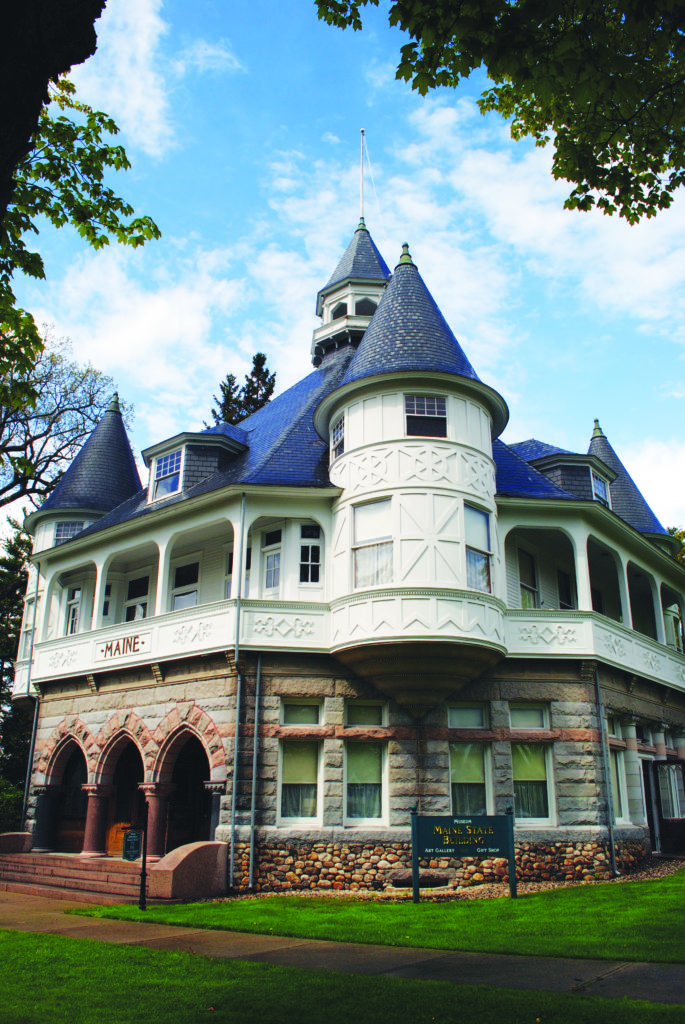
Poland Spring Preservation Society (PSPS) has opened its buildings for the 2020 season. This will be the 44th year that PSPS will be inviting visitors into the Maine State Building (1893), built in Chicago, Illinois, for the Worlds Fair and the All Souls Chapel (1912) to learn about the amazing history of Poland Spring. PSPS is located at 37 Preservation Way, Poland Spring, Maine. Hours are Thursday through Saturday, 9 a.m. to 4 p.m. and Sunday, noon to 3 p.m. Call (207) 998-4142 or visit PolandSpringPS.org for more information.
Separated by the pandemic part 1: Married for 53 years
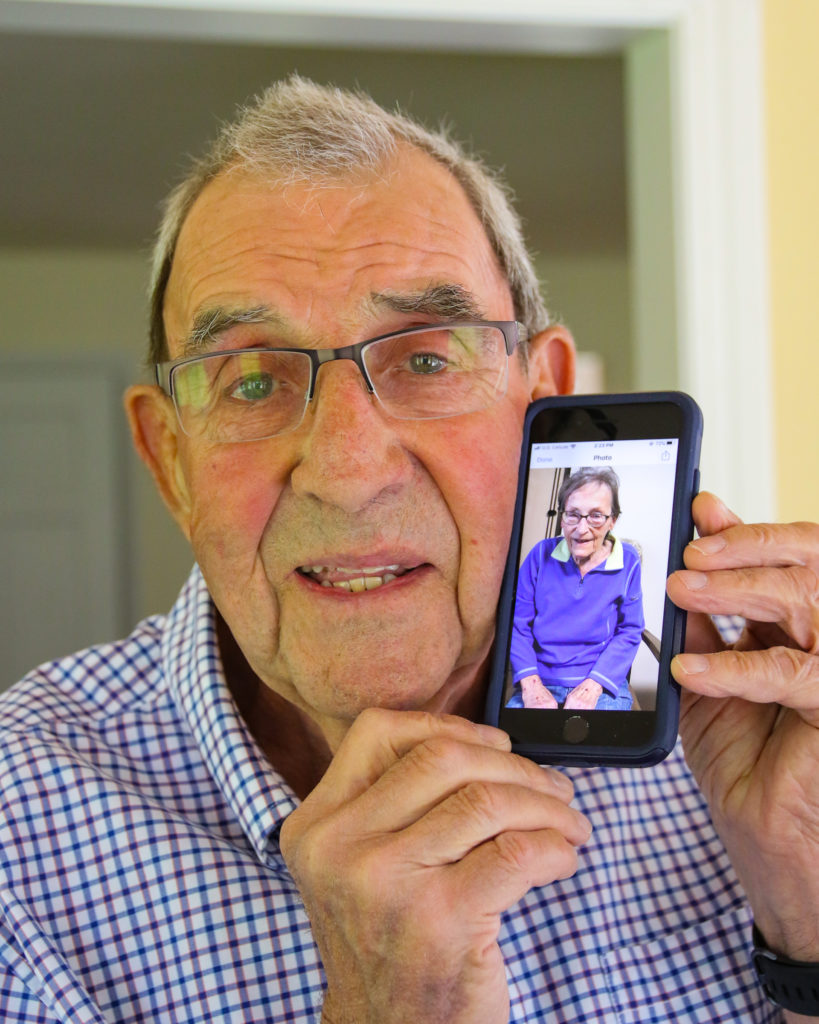
The following story is the first of many interviews being done by Nathan Tsukroff of PortraitEFX to capture the effects of this pandemic on the people of Maine.
Imagine being married for 53 years, sharing the joys and sorrows of raising a family and losing loved ones.
Now imagine not being allowed to touch the person you’ve loved all those years.
For Tim Mynahan and his wife, Bernadette Anne, of Dyer Road in Lewiston, this is the sad reality under the social-distancing needs brought on by the Covid-19 crisis.
Bernadette – known to her friends as “Bernie” and to her four granddaughters as “BB” – entered The Lamp Memory Care Center (DLTC Healthcare) in September of last year. Mynahan has visited his wife almost daily since then but has only been allowed to talk to her through a glass door since the middle of March, when the facility put rules in place to protect residents during the global pandemic. He also is able to talk with her via Facetime on his cellphone.
Just a few minutes drive from their longtime home, The Lamp is a 28-bed facility in Lisbon that provides care for seniors with Alzheimer’s or dementia. No touching or close contact is allowed by visitors for now, to keep Bernadette and the other patients safe.


